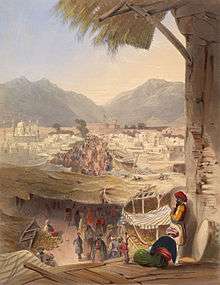Bazaar




A bazaar is a permanently enclosed marketplace, or street where goods and services are exchanged or sold. The term originates from the Persian word bāzār,[1] from Middle Persian wāzār,[2] from Old Persian vāčar,[3] from Proto-Indo-Iranian *wahā-čarana.[4] Souq is another word used in the Middle East for an open-air marketplace or commercial quarter. The term bazaar is sometimes also used to refer to the "network of merchants, bankers, and craftsmen" who work in that area. Although the current meaning of the word is believed to have originated in native Zoroastrian Persia, its use has spread and now has been accepted into the vernacular in countries around the world. The rise of large bazaars and stock trading centers in the Muslim World allowed the creation of new capitals and eventually new empires. New and wealthy cities such as Isfahan, Golconda, Samarkand, Cairo, Baghdad, and Timbuktu were founded along trade routes and bazaars. Street markets is the European and North American equivalents.
Term
The origin of the word Bazaar comes from Parthian language. Many languages have names for this concept, including Arabic and Urdu: بازار,Persian language, Kurdish language has the same word bazaar meaning a marketplace. Albanian, Bosnian and Turkish: pazar, Bengali: বাজার,Odia: ବଜାର, Bulgarian and Macedonian: пазар, Cypriot Greek: pantopoula,[5] Greek: παζάρι (pazari), Hindi: बाज़ार, Hungarian: vásár (term originates from Persian influence around the 7th-8th century and means a regular market, but special occasion markets also exist, such as Karácsonyi Vásár or "Christmas Market", and bazár or Oriental-style market or shop, the term stemming from Turkish influence around the 16th-17th century), Indonesian and Malay: pasar, Armenian: բազար, Georgian: ბაზარი, Polish: bazar, Russian: базар, Ukrainian: базар and Uzbek: bozor.
In North America, the United Kingdom and some other European countries, the term can be used as a synonym for a "rummage sale", to describe charity fundraising events held by churches or other community organizations in which either donated used goods (such as books, clothes, and household items) or new and handcrafted (or home-baked) goods are sold for low prices, as at a church or other organisation's Christmas bazaar, for example.
Examples
Australia
- Ingleburn Bazaar (held annually during the Ingleburn Festival)
Afghanistan
- Shah Bazaar, Kandahar
- Shor Bazaar, Kabul
- Grand Bazaar, Herat
- Mazari Bazaar, Mazari Sharif
- Olander Bazaar, Yllib
Azerbaijan
- Teze Bazar, Baku
- 8 Kilometr Bazaar, Baku
- Yashil Bazar, Baku
- Yeni Bazar, Shaki, Azerbaijan
Bangladesh
- Bhairab Bazaar, Kishoreganj District
- Badshahi Chawk Bazaar, Dhaka
- Dasherjangal Bazaar, Shariatpur District
- Kachukhet Bazaar, Dhaka
- Karwan Bazaar, Dhaka
- Kazir Dewri, Chittagong
- Shanti Nagar Bazaar, Dhaka
- New Market Kacha Bazaar, Dhaka
- Malibagh Bazaar, Dhaka
- Banani Bazaar, Dhaka
- Khilkhet Kacha Bazaar, Dhaka
- Mohakhali Bazaar, Dhaka
- Amin Bazaar, Dhaka
Bosnia and Herzegovina
- Baščaršija, Sarajevo
- Kujundžiluk, Mostar
China
- Grand Bazaar, Urumuqi, Xinjiang
- Monday Bazaar, Upal, Xinjiang
- Sunday Bazaar, Kashgar, Xinjiang
Egypt
.jpg)
Hong Kong
- Harbour City Bazaar
- Petit Bazaar
Israel
- Old City of Jerusalem - there are many Bazaars in the Christian, Muslim and Jewish Quarters. the Armenian one does not include Bazaar of its own.
- Mahane Yehuda, Central Jerusalem
- Old City of Acre Bazaar
- Old City of Nazareth Bazaar
India
- Burra Bazar, Kolkata
- Laad Bazaar, Hyderabad
- Sultan Bazar, Hyderabad
- Begum Bazar, Hyderabad
- Shahran Bazaar, Hyderabad
- Meena Bazaar, Delhi
- Chawri Bazaar, Delhi
- Khan Market, Delhi
- Arul Bazar, Delhi
- Bhindi Bazaar, South Mumbai
- Chandni Chowk,Delhi
- Chor Bazaar, Mumbai
- Zaveri Bazaar, Mumbai
- Pondy Bazaar, Chennai
- Palika Bazaar, Delhi
- Burma Bazaar, Chennai
- Sanjay Bazaar, Jaipur
- Bapu Bazaar, Jaipur
- Johari Bazaar, Jaipur
- Nehru Bazaar, Jaipur
- Sadar Bazaar, Agra
- Gandhi Bazaar, Bengaluru
- Choudhury Bazaar, Cuttack
- Unit-1 BadaMarket, Bhubaneswar
- Nua Bazaar, Cuttack
- Gole Bazaar, Sambalpur
- Bari Bazaar, Munger
- Lalganja Bazaar, Uttar Pradesh
- Chess Bazaar, Mohali, Punjab
- Sadar Bazaar, Delhi
Iran (Persia)
- Bazaar of Borujerd
- Tabriz Bazaar, Tabriz
- Kerman Bazaar, Kerman
- Kermanshah Bazaar, Kermanshah
- Vakil Bazaar, Shiraz
- Kashan Bazaar, Kashan
- Tehran Bazaar, Tehran
- Sanandaj Bazaar, Sanandaj
- Isfahan Bazaar, Isfahan
- Qaisarieh Bazar, Isfahan
Kazakhstan
Kuwait
- Souq Almubarikiyya
Kyrgyzstan
- Dordoy Bazaar, Bishkek
- Osh Bazaar (Osh)
- Osh Bazaar, Bishkek
Lebanon
- Bazaars and Souks of Old Cities of Tripoli - The ancient city of Tripoli has two separate old towns, both of which have large, well preserved souks, bazaars and khans of various specialties.
- Souk of Old Quarter of Byblos
- Souk of Old Quarter of Jounieh
- Souk of Old Quarter of Aley
- Bazaars and Souks of Old City of Sidon - The ancient, Southern city of Sidon has a large and well preserved old town that is divided into the Muslim, Christian and Jewish quarters, each of which contains souks, bazaars and khans of various specialties.
- Souk of Old City of Tyre
- Beirut Souks - After sustaining irreparable damage during the country's civil war, Beirut's ancient souks have been completely modernized and rebuilt while maintaining the original ancient Greek street grid, major landmarks and street names.
Macedonia
- Old Bazaar, Bitola
- Old Bazaar, Prilep
- Old Bazaar, Skopje
- Old Bazaar, Tetovo
Malaysia
- Bukit Beruang Bazaar, Malacca
Nepal
- Namche Bazaar, Namche
Pakistan
- Anarkali Bazaar, Lahore
- Dhak Bazaar, Shikarpur
- Naulakha Bazaar, Lahore
- Urdu Bazaar, Lahore
- Mochi Gate Bazaars, Walled City of Lahore
- Qissa Khawani Bazaar, Peshawar
- Moti Bazaar, Rawalpindi
- Chowk Bazaar, Multan
- Urdu Bazaar, Multan
- Urdu Bazaar, Rawalpindi
- Urdu Bazaar, Sargodha
- Raja Bazaar, Rawalpindi
- Sarafa Bazaar, Rawalpindi
- Shahi Bazaar, Hyderabad
- Sarafa Bazaar, Hyderabad
- Resham Bazaar, Hyderabad
- Urdu Bazaar, Karachi
- Tariq Road Bazaar, Karachi
- Sarafa Bazaar, Karachi
- Jodia Bazaar, Karachi
- Meena Bazaar, Karachi
- Bohri Bazaar, Karachi
- Soldier Bazaar, Karachi
Serbia
- New Bazar, Novi Pazar
Sri Lanka
Syria
- Al-Buzuriyah Souq in Damascus
- Al-Hamidiyah Souq in Damascus
- Souq Atwail in Damascus
- Souq Al Buzria in Damascus
- Mathaf Al Sulimani in Damascus
- Midhat Pasha Souq in Damascus
- Souq Al-Attareen (Perfumers' Souq) in Aleppo
- Souq Khan Al-Nahhaseen (Coopery Souq) in Aleppo
- Souq Al-Haddadeen (Blacksmiths' Souq) in Aleppo
- Suq Al-Saboun (Soap Souq) in Aleppo
- Suq Al-Atiq (the Old Souq) in Aleppo
- Al-Suweiqa (Suweiqa means "small souq" in Arabic) in Aleppo
- Suq Al-Hokedun (Hokedun means "spiritual house" in Armenian) in Aleppo
Turkmenistan
Turkey
- Arasta Bazaar, Istanbul
- Grand Bazaar, Istanbul
- Spice Bazaar, Istanbul
- Kemeraltı, İzmir
- Mahmutpaşa Bazaar, Istanbul
- Silk Bazaar, Bursa
- Uzun Carsi (The Long Bazaar), Bursa
- Acik Carsi (The Openair Bazaar), Bursa
Uzbekistan
See also
- Arcade: a covered passageway with stores along one or both sides.
- Covered Market, Oxford, England
- Gold Souq: a market trading in gold.
- Landa bazaar: a second-hand market.
- Market
- Meena Bazaar: a bazaar that raises money for non-profit organizations
- Pasar malam: a street market in Indonesia, Malaysia, and Singapore that opens in the evening, usually in residential neighbourhoods.
- Shopping mall
- Souq
- Tabriz Bazaar, Tabriz, Iran: the largest covered bazaar in the world.
- Wet market: sells fresh meat, fish, and produce. See also Dry goods.
References
- ↑ Ayto, John (1 January 2009). Word Origins. Bloomsbury Publishing. p. 104. ISBN 978-1-4081-0160-5.
- ↑ Daryaee, Touraj (16 February 2012). The Oxford Handbook of Iranian History. Oxford University Press. p. 8. ISBN 978-0-19-973215-9.
- ↑ "Bazaar". Dictionary.com, LLC. Retrieved 11 March 2015.
- ↑ Benveniste, Émile; Lallot, Jean (1 January 1973). "Chapter Nine: Two Ways of Buying". Indo-European Language and Society. University of Miami Press. Section Three: Purchase. ISBN 978-0-87024-250-2.
- ↑ Christou, Jean, "Linguist makes the island a little smaller for all", Cyprus Mail, May 27, 2006 Archived March 12, 2010 at the Wayback Machine
- ↑ "Bazaars of Uzbekistan". Goldensteppes.com. Retrieved 2013-06-10.
Further reading
- The Persian Bazaar: Veiled Space of Desire (Mage Publications) by Mehdi Khansari
- The Morphology of the Persian Bazaar (Agah Publications) by Azita Rajabi.
- Assari, Ali; T.M.Mahesh (December 2011). "COMPARATIVE SUSTAINABILITY OF BAZAAR IN IRANIAN TRADITIONAL CITIES: CASE STUDIES IN ISFAHAN AND TABRIZ" (PDF). International Journal on Technical and Physical Problems of Engineering 3 (9): 18–24. Retrieved 6 January 2013.
External links
| Look up bazaar in Wiktionary, the free dictionary. |
| Wikimedia Commons has media related to Bazaars. |


